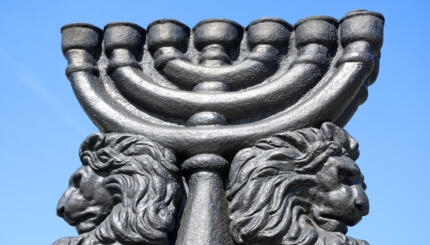Commentary on Parashat Tzav, Leviticus 6:1-8:36
Tzav is only the second portion in Leviticus, but already we are immersed in the sacrificial rites. In great detail we read the instructions for sacrificing burnt offerings, meal offerings, sin offerings, guilt offerings, and the like. In the second half of the portion, we read how Moses enacted the sacrificial rite by which Aaron and his sons were anointed as priests.
Is Tzav Repellent?
Many of us find this material hard going, if not utterly repellent. But Judaism is known for the art of textual interpretation, and this portion is a prime example. As Rabbi Arthur Green has pointed out, the opening verses of Tzav have long been interpreted as speaking of the deepest, most inward form of spirituality. In the Sephardic and hasidic prayerbooks, these opening verses are recited each morning as a prelude to daily worship.
How was Tzav transformed in this way?
The opening verses of Leviticus 6 state:
With your help, My Jewish Learning can provide endless opportunities for learning, connection and discovery.
This is the Torah of the burnt-offering… The fire on the altar shall be kept burning, not to go out: the priest shall burn wood upon it each morning, each morning … A perpetual fire shall be kept burning on the altar, not to go out. (verses 1, 4, 6)
Three times in six verses there is reference to the fire burning on the altar and not going out. What is this fire that must not be extinguished?
Green’s translation of the Sefat Emet, the Torah commentary of the Hasidic Rabbi Yehudah Leib Alter of Ger, gives us a glimpse into the various meanings of this fire–among them, the life force within each of us, the fear of God, the Torah which gives light, the light of redemption and hope.
Commenting on these verses in Tzav, the Sefat Emet wrote: “In the soul of every Jew there lies a hidden point that is aflame with love of God, a fire that cannot be put out.” But the human longing to worship the Creator must be renewed each day, as we read: “The priest shall burn wood upon it each morning, each morning.”
The fire is always there, and yet the struggle must take place each day to overcome that which might smother it–that which distracts us, or distances us, or turns us away from love and worship, from offering service with the fullness of our hearts.
On the verse “A fire must continually be lit on the altar” (esh tamid tukad al ha-mizbei’akh), Rashi notes that the term “tamid” (“continual” or “always”) is the same term used to describe the “ner tamid,” the “eternal light” that burned in the sanctuary. Since the destruction of the Temple, the ner tamid in our own synagogues serves as a reminder of the need for continual service and the fact of God’s continual presence.
The word “tamid” calls to mind the well-known verse from Psalms that also proclaims God’s presence. This verse is inscribed on the ark in many shuls: Shiviti Adonai le-negdi tamid, “I have set the Lord before me always.” Traditionally, this is taken to mean that one should keep God in mind when one prays–and indeed, at all times–so that one’s prayers, acts, and words are intentional and righteous.
But in a plainer sense, setting someone (or some One) before us implies an image that we see in our mind’s eye. We know that we are each made in God’s image. As Art Green has written, in some basic way, “this seems to mean that the human face–every human face–is a copy or reflection of the face of God.” Is it possible to keep that Adonai in our mind’s eye all the time? An Adonai Who encompasses the faces of every living human being?
Not Just People We Know
And not just the faces of those whom we know, but especially the faces of people whom we do not normally keep in front of us–the faces of people starving in Africa; of the twenty-seven million people enslaved or held in debt bondage in the Sudan, Mauritania, India, Haiti, and elsewhere; of children drugged and pressed into service as soldiers in Sierra Leone; of families whose lives are destroyed by earthquakes and hurricanes.
The faces of those who are tortured in hidden prisons, mistreated and murdered by police and security forces in Latin America. The faces of those who languish year after year in American jails for ridiculously light drug crimes. The faces of both Palestinians and Israelis, caught up in a cycle of violence and historical injustices. The faces of the poor, the ill, the hungry, the malnourished, in virtually every country on Earth.
Can we keep their faces in front of us at all times? This is where “tamid” poses such a challenge. The challenge is not to turn away, not to give up out of hopelessness or frustration, not to pretend that our affluent lives can properly be lived in a vacuum away from the rest of the world.
This is the challenge of Tzav–to keep the fire burning continually. To open our worship and prayer practices to the anguish of the world. To keep these faces of humanity, these aspects of God’s image in front of us, always.
Provided by SocialAction.com, an online Jewish magazine dedicated to pursuing justice, building community, and repairing the world.
A few follow-up resources:
American Jewish World Service: www.ajws.org
Amnesty International: www.aiusa.org
Mazon: A Jewish Response to Hunger: www.mazon.org
The American Anti-Slavery Group: www.anti-slavery.org
Adonai
Pronounced: ah-doe-NYE, Origin: Hebrew, a name for God.
ark
Pronounced: ark, Origin: English, the place in the synagogue where the Torah scrolls are stored, also known as the aron kodesh, or holy cabinet.
Sephardic
Pronounced: seh-FAR-dik, Origin: Hebrew, describing Jews descending from the Jews of Spain.
Torah
Pronunced: TORE-uh, Origin: Hebrew, the Five Books of Moses.


